[an error occurred while processing this directive]
Antique Beer Photos:
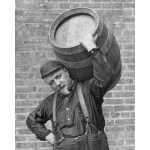
Dozens of prints available in a variety of sizes up to 40x50. |  |
|
|
The Originators of Rheingold Beer
From Ludwigsburg to Brooklyn – A Dynasty of German-Jewish Brewers
By Rolf Hofmann.
(Originally published in Aufbau, June 21, 2001. Reprinted by permission of the author).
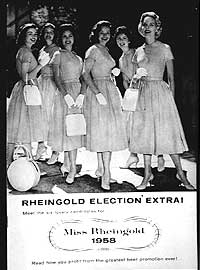 New Yorkers over the age of fifty will remember the brand name Rheingold Beer and the company's brilliant publicity stunt in which a bevy of attractive young women competed annually for the privilege of being elected that year's Miss Rheingold and appearing in ads on billboards and in the subways throughout the New York area. New Yorkers over the age of fifty will remember the brand name Rheingold Beer and the company's brilliant publicity stunt in which a bevy of attractive young women competed annually for the privilege of being elected that year's Miss Rheingold and appearing in ads on billboards and in the subways throughout the New York area.
The beer's evocative name with its allusion to Germany's great river, was the culmination of a German-Jewish family enterprise that had its beginnings in 1840 in the town of Ludwigsburg, north of Stuttgart, in what was then the Kingdom of Württemberg. One Samuel Liebmann, a member of a prominent Jewish family in the region, settled there and bought the inn and brewery "Zum Stern." A liberal and staunch supporter of Republican ideals, Liebmann encouraged other like-minded citizens, including some soldiers from the garrison, to meet in his hospitable surroundings. The ideas fomented there contributed to the local revolution of 1848. It brought the opprobrium of the King down upon Liebmann's enterprise, and "Zum Stern" was declared off limits to the soldiers. Soon thereafter, in 1850, Samuel Liebmann emigrated to the U.S.
The family settled in Brooklyn and Samuel, together with his three sons, Joseph, Henry, and Charles, opened a brewery once again at the corner of Forest and Bremen Streets. With the responsibilities divided among the family – Henry became the brewing expert, Charles. the engineer and architect, Joseph, finance manager – the company was already flourishing by the time of Samuel's death in 1872. Success also led to a concern for the company's Brooklyn surroundings, and the Liebmanns became involved in local welfare – focusing on housing and drainage systems.
Each of the three brothers had two sons, and when the older Liebmanns retired in 1903, the six members of the third generation took over. Other members of the family also contributed to the gradual expansion of the company. In 1895 Sadie Liebmann (Joseph's daughter), married Samuel Simon Steiner, a trader in high quality hop, an essential ingredient for good beer. Steiner's father had begun merchandising hop in Laupheim in 1845 and still today, S.S. Steiner, with its headquarters in New York, is one of the leading hop merchants. Under these fortuitous family circumstances, beer production grew constantly. In the early years, the brewery had produced 1000 barrels per year, by 1914 its output stood at 700,000 barrels.
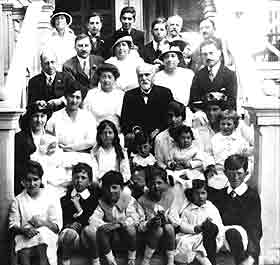 | 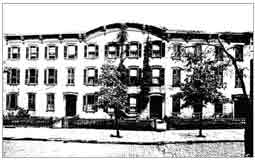 | Left: Henry Liebmann (center with white beard) and family.
Above: House in Brooklyn, where Samuel Liebmann lived with his three sons Henry,
Joseph and Charles. |
Unfortunately, political developments in the U.S. between 1914 and 1933 were extremely disadvantageous for the Liebmann brewery. The resentment against Germany and anything German during World War I led to an informal boycott of German beers. Following close upon the lean wartime years, was the implementation of Prohibition in 1920 forbidding the manufacturing and trading of alcohol. The Liebmann enterprise managed to survive by producing lemonade and a product they called "Near Beer."
With the reinstatement of legal alcohol production under President Roosevelt in 1933, opportunities for the brewery opened up, abetted by the anti-Semitic policies of Hitler's Germany. The pressures on Jewish businessmen there, brought Dr. Hermann Schülein, general manager of the world-renowned LšwenbrŠu brewery, to America. Schulein's father, Joseph, had acquired two of Munich's leading breweries at the end of the nineteenth century--Union and Münchner Kindl--and his son had managed the 1920 merger with Löwenbrau. Arriving in New York with this experience behind him, Hermann Schülein became one of the top managers of the Liebmann brewery and was instrumental in its spectacular growth after World War II.
Working with Philip Liebmann (great-grandson of Samuel), Schülein developed a dry lager beer with a European character to be marketed under the brand name "Rheingold." According to company legend, the name was created in 1883 at a brewery dinner following a performance at the Metropolitan Opera. When the conductor took up his glass, he was so taken with the shade of the beer, that he declared it to be the color of "Rheingold." For New Yorkers, however, the name Rheingold did not bring to mind the Nibelungen fables, but the pretty young ladies who participated in Schülein's most brilliant marketing strategy – the selection of each year's Miss Rheingold by the beer-drinking public of greater New York
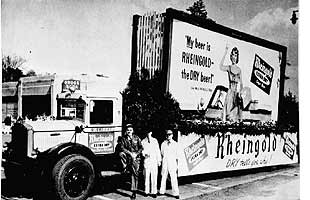 At the height of the campaign's success in the 1950's and 60's, the Liebmann Brewery had an output of beer ten times that of Löwenbrau at the same time in Munich. At the height of the campaign's success in the 1950's and 60's, the Liebmann Brewery had an output of beer ten times that of Löwenbrau at the same time in Munich.
For thirty years, Rheingold Beer reigned supreme in the New York area, but by 1976, as a local brewery, it could no longer compete with nationwide companies such as Anheuser & Busch, Miller, and Schlitz, and its doors were closed. Only recently, using the same brewmaster, Rheingold is once again being sold in the tri-state area.
An interesting coda to the story of the Liebmann and Schülein enterprises is the fate of Hermann Schülein's father and brother. Joseph Schülein, who was made a Geheimrat (Special Councillor) by the Bavarian king, did not play an active role at Löwenbrau after the merger. Together with his son, Dr. Fritz Schülein, he spent most of his time at his farm at Kaltenberg Castle west of Munich, which he acquired in 1918. He was much loved by the people in the area, many of whom worked for him, and when he died in 1938, they took part in the funeral at the Jewish cemetery in Munich.
Soon after, however, his son fled to his brother in New York, after being arrested and held for a brief period in the Dachau concentration camp.
Fritz Schülein regained possession of Kaltenberg Castle in 1949, but sold it six years later to the Wittelsbach family, descendants of the former Bavarian kings. Today Kaltenberg is famous for its medieval contests and its excellent beers.
This story is one of the major topics of Harburg Project, a jewish genealogical research initiative which was founded in connection with the organization of the former Synagogue of Harburg as a cultural center 1989-1992.
Readers who want the complete 6-page story as an e-mail attachment may contact the author at HarburgProject@aol.com.
|

